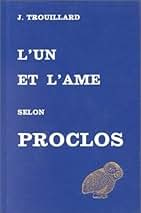When "Secondary" Scholarship is No Longer Secondary
A Reflection on Fr. Jean Trouillard (and others)
Making the transition from a Great Books school to graduate education can be disorienting, and one of the sources of this disorientation is the sudden confrontation with “secondary scholarship,” previously marginal if not viewed without outright suspicion.
This suspicion is often merited. One has to learn the hard way that not everyone sees careful reading of primary sources as the central form of initiation into a tradition. Still more alarmingly, many do not see their education as initiation at all! And we are all familiar with the vices of those who have lost themselves in bibliographies and beneath piles of erudite articles. Thus the old bromide: secondary sources are what you read second.
But perhaps the more interesting phenomenon is the discovery that certain works of scholarship blur this boundary. There are texts which, despite taking the form of the monograph (and too recent to have themselves become canon), can hardly be called “secondary.”
Here I am thinking of books like Peter Brown’s biography of Augustine or Jean Trouillard’s L’un et l’âme selon Proclos.
These are works which have a depth and richness comparable to any “great book,” transcending the genre of academic writing, and capable of accomplishing an initiation or transformation of the soul. They can be recommended to others as potential watershed moments in one’s education.
I think the opening pages of the latter work, in particular, are a kind of manifesto of sorts, laying out what it means to write something, as a scholar, which is really worth reading. I have translated them below, at some length.
This essay stems from a scruple. I have the naïveté to believe that if we are not capable of a brief and coherent exposition of a philosopher’s fundamental approach, it’s thereby proven that he remains foreign to us. We can doubtless be acquainted with the historical conditions and elementary structures of his teaching. But we have not grasped his meaning. For a thought which is not one is not a thought.
This affirmation will perhaps surprise those who hold that erudite studies alone open for them the secret of a philosophy. It’s sufficient for them, in effect, to make a compilation. But before a rigorously connected system, such as the one that appears in the Elements of Theology, it is ultimately necessary to go from the whole to the parts. For fragmentary elucidations only make sense through the thinker’s total perspective. Knowing that Parmenides influenced Plato clarifies little for me if I know neither what Parmenides nor Plato wished to say.
In a paradoxal fashion, the controlling unity appears better still in Proclus because his borrowings are more numerous and more disparate. I do not believe that it can be contested by anyone who will read him by posing to him these problems which are “the eyes of the mind.” More still than his ingenuity in the arrangement of ideas, the profound simplicity of certain pages leave no doubt of it, as we shall see. They witness to the fact that, beneath the often weighty logical ordering, Proclus is an intuitive and that he knew how to connect each intuition to its generative center.
But one must recognize that it is an adventure to penetrate the anteroom of such a complex and extended work - and to give it expression. This is an adventure which the author of these lines has certainly not finished living. He wishes only to fix the present state of his inquiries and trace an itinerary….
The study of Proclus requires… an effort of disorientation. But it is not so easy to overcome one’s own mental routines. At his own expense, he who takes himself to be a bold innovator soon learns that all solid invention relies on a long labor of assimilation. We wish in this brief work to held the reader to accomplish this, while sparing him impasses and long detours.
We can doubtless propose many shortcuts - many an Ariadne’s thread - to orient ourselves in this labyrinth. The one we are going to present, without pretending that it is the only one possible, has the merit of simplicity. It relies on Proclus’ repeated declarations that we know nothing except in and traversing the soul, but that the soul in turn only attains itself beneath the motion of the One, and in its light. Philosophy thus moves in the relation of the soul and the One.
To summarize, what are the features of a work which is no longer simply “secondary scholarship”?
A drive to holism which attempts to inhabit, and reproduce from within, the unity of another thinker’s thought.
This is only possible alongside
An appropriation for oneself of the questions and truths which possessed that thinker, lending the work a philosophical quality in its own right.
This implies
A speculative and anagogic disposition which relativizes boundaries of time and place and sets to one side erudite fears of “anachronism” or “lack of objectivity.”
One who has the mastery to do this also has
The freedom to buck conventions of academic writing and present something which has an authoritative voice and literary artistry of its own.
And the goal of all of this is
The invitation for the read to let something happen in their soul, beginning a process of initiation into the unity and power of a thought which is universal.
Such a work stages an itinerary.



